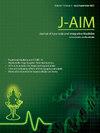一项前瞻性、随机、开放标签、平行组、对照临床试验,评估中药口服胶囊联合直肠药物治疗改善2型糖尿病合并慢性肾病(CKD)患者肠道健康的安全性和有效性。
IF 1.9
Q3 INTEGRATIVE & COMPLEMENTARY MEDICINE
引用次数: 0
摘要
慢性肾脏疾病(CKD)是全球主要的健康问题,有超过8.5亿人患有该疾病。已经进行了几项研究来减少CKD患者的炎症;并研究肠道菌群和炎症之间的关系。目的中药制剂改善肠道菌群和减轻炎症的作用尚未得到较早的研究。本研究旨在评价中药制剂联合标准护理治疗与标准护理治疗的疗效。方法对90例患者进行前瞻性、随机、平行组临床试验,随机分为标准治疗组(SOC)加草药治疗组(IP)和仅标准治疗组(SOC)。腹痛评分的变化、致病性和非致病性微生物组的百分比变化是研究的关键终点。安全性评估是根据不良事件、血液学和生化参数的变化进行的。结果两组患者人口学及其他特征差异无统计学意义。第90天,SOC + IP组腹部中位评分(2.00)显著低于SOC组(3.00)(p = 0.002)。SOC + IP组患者生活质量评分显著提高(p <;0.001),与SOC组不同。SOC + IP组病原菌数量显著减少;然而,在这一组中,非致病微生物的减少并不显著。不良事件(ae)均为轻度,两组不良事件发生率差异无统计学意义。结论补充IP联合SOC可显著改善CKD患者肠道菌群,提高CKD患者的整体生活质量。这种治疗组合可用于有效的患者管理。本文章由计算机程序翻译,如有差异,请以英文原文为准。
A prospective, randomized, open label, parallel group, comparative clinical trial to evaluate the safety and efficacy of combination of herbal oral capsule and rectal medication to improve gut health of type 2 diabetic patients having chronic kidney disease (CKD)
Background
Chronic kidney disease (CKD) is a major health concern globally, with more than 850 million people suffering from it. Several studies have been carried out to reduce inflammation in CKD patients; and to study the relationship between gut microbiota and inflammation.
Objective
The effect of herbal formulations to improve the gut flora and reduce inflammation has not been studied earlier. The study aims to evaluate effect of herbal formulation combined with standard of care (SOC) treatment compared to SOC.
Methods
A prospective, randomized, parallel group clinical trial was planned on 90 patients split equally into standard of care (SOC) with herbal treatment (IP) and only SOC groups. The change in the abdominal pain score, percent change in the pathogenic and non-pathogenic microbiome were the key endpoints of interest. The safety assessment was in terms of adverse events, changes in hematological and biochemical parameters.
Results
The demographic and other patient characteristics showed statistically non-significant differences between two groups. On day 90, the median abdominal score in SOC + IP group (2.00) was significantly lower than that of SOC group (3.00) (p = 0.002). The quality of life score improved significantly in SOC + IP group (p < 0.001), unlike SOC group. There was significant reduction in pathogenic microbes in SOC + IP group; however, the reduction in non-pathogenic microbes was non-significant in this group. The adverse events (AEs) were in mild form, and the proportion of patients with AEs differed non-significantly between two groups.
Conclusion
The IP supplementation along with SOC significantly improved the GUT micro flora, and improved the overall quality of life of CKD patients. This treatment combination can be practiced for effective patient management.
求助全文
通过发布文献求助,成功后即可免费获取论文全文。
去求助
来源期刊

Journal of Ayurveda and Integrative Medicine
INTEGRATIVE & COMPLEMENTARY MEDICINE-
CiteScore
4.70
自引率
12.50%
发文量
136
审稿时长
30 weeks
 求助内容:
求助内容: 应助结果提醒方式:
应助结果提醒方式:


